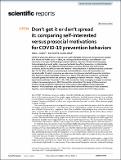Don’t get it or don’t spread it: comparing self-interested versus prosocial motivations for COVID-19 prevention behaviors
Author(s)
Jordan, Jillian J; Yoeli, Erez; Rand, David G
DownloadPublished version (3.985Mb)
Publisher with Creative Commons License
Publisher with Creative Commons License
Creative Commons Attribution
Terms of use
Metadata
Show full item recordAbstract
<jats:title>Abstract</jats:title><jats:p>COVID-19 prevention behaviors may be seen as self-interested or prosocial. Using American samples from MTurk and Prolific (total <jats:italic>n</jats:italic> = 6850), we investigated which framing is more effective—and motivation is stronger—for fostering prevention behavior intentions. We evaluated messaging that emphasized <jats:italic>personal</jats:italic>, <jats:italic>public</jats:italic>, or <jats:italic>personal and public</jats:italic> benefits of prevention. In initial studies (conducted March 14–16, 2020), the Public treatment was more effective than the Personal treatment, and no less effective than the Personal + Public treatment. In additional studies (conducted April 17–30, 2020), all three treatments were similarly effective. Across all these studies, the perceived <jats:italic>public</jats:italic> threat of coronavirus was also more strongly associated with prevention intentions than the perceived <jats:italic>personal</jats:italic> threat. Furthermore, people who behaved prosocially in incentivized economic games years before the pandemic had greater prevention intentions. Finally, in a field experiment (conducted December 21–23, 2020), we used our three messaging strategies to motivate contact-tracing app signups (<jats:italic>n</jats:italic> = 152,556 newsletter subscribers). The design of this experiment prevents strong causal inference; however, the results provide suggestive evidence that the Personal + Public treatment may have been more effective than the Personal or Public treatment. Together, our results highlight the importance of prosocial motives for COVID-19 prevention.</jats:p>
Date issued
2021Department
Sloan School of ManagementJournal
Scientific Reports
Publisher
Springer Science and Business Media LLC
Citation
Jordan, Jillian J, Yoeli, Erez and Rand, David G. 2021. "Don’t get it or don’t spread it: comparing self-interested versus prosocial motivations for COVID-19 prevention behaviors." Scientific Reports, 11 (1).
Version: Final published version